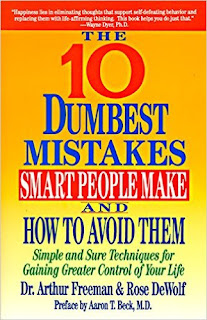It's not
enough to merely gain insight into your mistakes. It's also important
to stop making them.
Insight
is very important (but) insight is not enough. All your new knowledge
will not help you unless you put it to work. As any scientist would
admit, the true benefits of knowledge do not occur until that
knowledge is used in practice.
Solving
your own problems requires both knowledge and action … You must
move beyond insight to action.
Scheduling
Time … A written schedule can help you gain control of your life.
If you are going to take an action, any action, you must make time to
do so … Systematic use of schedules has proven a particularly
effective tool for people who are victims of the Chicken Little
syndrome of the what-if block … If you write down how you now spend
your time, you may find that you spend a great deal of it worrying …
Planning more effective use of your time forestalls or minimizes
thinking mistakes … Schedules are particularly useful in times of
crisis and extra stress, because when you are going through a
difficult period, like divorce or illness, special responsibilities
are added to your normal chores, duties, and activities. This can
make you feel overwhelmed to the point where you don't even do the
most routine things well … (If you are out of work) report for job
hunting just as you would report for a job. Job hunting becomes the
new job.
If you
are overly stressed by an upcoming event it may be wise to schedule
some preparation time.
Don't
forget to schedule social time. Especially if you are a workaholic or
a perfectionist. Sometimes people hesitate to throw a party for fear
things will not be perfect enough.
Planning
Experiences for Mastery or Pleasure
Planning
pleasure – Planning a structured way to increase your pleasure can
be especially beneficial to people who would like others to read
their minds.
Building
self-esteem – Success builds self-esteem, and so investing time in
activities in which you know you will have success is worthwhile …
Anything that you have handled successfully, no matter how small it
is, is worth repeating.
Planning
practice – The most talented actor needs rehearsal. Nobel Prize
winning scientists try first this and then that until they find the
formula that matters. And so it is with every human endeavor. Even
the gift of gab is found most often in those who have practiced
talking to others … If you tend to ask what if, the answers will
come with practice.
Problem
Solving … One of the most useful strategies in dealing with real
problems is to ask: “What will it take to solve this problem?”
instead of: “Can this problem be solved?”
Seeking
solutions – When you are feeling stressed, you often reject a
solution that occurs to you simply because it has occurred to you …
Ask: “Has anyone, anywhere, ever succeeded in solving this
problem?”
Breaking
Your Goal Into Small Steps … Possibly the greatest single barrier
to reaching any goal is the feeling that the action required is too
big, too difficult, too costly, or too threatening … A technique
for dealing with this is to think about a first step rather than the
final goal.
Role
Playing … Most people play more roles than they are aware of. They
act stern with a child to enforce needed discipline even though they
are inwardly amused. They act concerned about a customer's complaint
even though they really think this customer is a crank. Etc … Role
playing is a very powerful action technique. If you want to behave
differently, you can play a different role.
Writing
a script – It can be helpful to write a script in advance for the
role you intend to play. Role playing works in all kinds of
situations. If you are going to make a telephone call to sell
something, you might pretend to be a salesperson who loves to make
telephone calls, who is not at all bothered by fifty rejections
because the fifty-first call might be successful.
Trying
Out New Behavior … A related technique to role playing is trying
out new behavior. That just means practicing a role. Teenage boys
practice looking cool. Teenage girls practice looking glamorous. You
can practice looking calm. You can practice a smile. You can practice
just saying hello. You can practice a job interview with a friend.
Relaxation
… You might not think that relaxation belongs in a list of action
technique. But consciously making yourself relax can be very helpful
action … Your aim is to take your mind away from whatever is
causing tension and fixing it on something that will bring about
relaxation. So the more deeply you think about, visualize, and
describe to yourself that calming place, the calmer you will be.
Chapter
Fourteen – Living Better
“One
kind of happiness is to know exactly at what point to be miserable,”
wrote seventeenth-century epigrammatist Francois duc de La
Rochefoucauld.
Here's a
simple and easy way to remind yourself of the therapy described in this
book:
Think of the word IDEA as an acronym for:
Think of the word IDEA as an acronym for:
I –
Identify the thinking mistaking you are making. (Review those
automatic thoughts flitting through your brain.)
D –
Define the mistake. (What does it mean to you? How is it affecting
you life? What evidence do you have that it exists?)
E –
Evaluate your course of action. (Think of alternatives. Consider
advantages and disadvantages.)
A –
Act. Remember insight is only the first step. Now you must take
action.
Life is
like dust–constantly having to be cleaned up and cleaned off.
When it
comes to a solution, you have to say: “It's up to me.”
